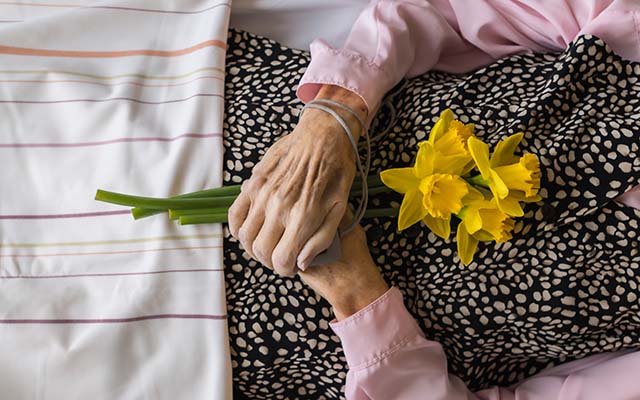-
Completely agree This is a loaded question. If policies are "well-designed" I take it to mean they will appropriately deal with the many objections to assisted dying (e.g., around informed consent, absence of coercion, etc). And thus it should follow that ill-being of the sufferer will end and the well-being of relatives and loved ones will be enhanced. But a more interesting question might have been: "Do you trust Government to design, implement and maintain good policies for assisted dying?" I am not sure my answer to that would have been a positive one.
Professor Mark Wooden
Professorial Research Fellow and Director of the HILDA Survey Project, Melbourne Institute: Applied Economic and Social Research, Faculty of Business and Economics, University of Melbourne -
Completely agree Jeremy Bentham encouraged us to pursue happiness and avoid pain. Currently, some people with terminal illnesses suffer either physical and/or mental pain as a result of their condition. Hospice care can help alleviate suffering but it is not the preferred path of all in this situation. For those of us who follow the utilitarians' concepts of wellbeing, it therefore behoves us to address the unnecessary pain experienced by some terminally ill patients. One means to end the pain that may be chosen by the patient is to end their life. In modern societies, they may do so by themselves since suicide is no longer illegal in most (enlightened) countries. However their condition may mean that they lack the ability to complete this action without assistance. Provided they make a decision to end their life while in sound mind, with independent sign-off from medical staff (that their condition is terminal) - and provided that any person who is asked to assist in ending the life also agrees to participate - then the logical consequence of wishing to prevent unnecessary pain in these circumstances is to allow assisted dying with the safeguards noted above.
Professor Arthur Grimes
Chair of Wellbeing and Public Policy, School of Government, Victoria University of Wellington -
Agree It gives individual the freedom to choose a self-determined life until the very end. However, it may be very hard for relatives too.
Professor Ronnie Schob
Professor, School of Business and Economics, Freie Universitat Berlin -
Completely agree "Severe pain with no realistic hope for recovery puts people at the most negative possible level of affect for the remainder of their lives. Ending their lives through a well-designed assisted dying policy would end this suffering and substantially improve their average affect over their lifetime. Severe pain also affects relatives and friends, who have to see a person close to them suffer. An early end to that person's suffering would also improve the affect of their relative and friends. Later on, as these relatives and friends reflect on the life of the now dead person, the affective quality of their memories would be disproportionately affected by the last period in that person's life. If the person dies in suffering after an extended period of pain, those memories would be clouded by that ending. If, instead, the person is able to have a dignified painless death, these memories would be much more positive. In so far as that person is important to them, these memories can have a substantial impact on their subjective well-being for the remainder of their own lives. Against this, there will inevitably be cases where a person decides to end his or her life, but some family members would like the person to continue to ""fight"". Such family members may become less happy if assisted dying becomes legal. Then again, the ""fighting"" option carries its own risks in needless suffering and the risk of a person dying before the family properly says goodbye. It is quite possible that even the people who disapprove of legalising assisted dying will see their subjective well-being improved by it."
Professor Guy Mayraz
Lecturer, University of Sydney -
Completely agree "The premise is about ""well-designed"" policies. Well-designed policies increase wellbeing. QED I would add that --- in addition to the important arguments about the awful way we have been treating our elders in some countries (like mine) and the inordinate proportion of resources that go to keeping people afloat for their last five years, and besides some quibbles about needing to define wellbeing carefully so that we don't overly value miserable life extensions --- I believe the right to suicide is also important for those who are simply unhappy. Here is my view on that: https://cpbl.wordpress.com/2021/03/30/respect-for-suicide/ Legalising euthanasia more liberally could keep a lot of young people *alive*. However, this is all my lay opinion. We clearly need to move with humility in these policies, and to measure elders' wellbeing carefully. In Canada, the policy has been laid out nicely so that the ""easier"" cases become legal first, so that institutions and expertise can adjust, while the right to die for mental health reasons comes into force only after a few years of experience. Well-designed policy, I think. "
Professor Chris Barrington-Leigh
Associate Professor, McGill University -
Completely agree Assuming that everyone involved agrees to the process, removing a limitation on individually expressed preferences should be welfare enhancing
Professor Arie Kapteyn
Professor of Economics, University of Southern California -
Completely agree Well-designed legalised euthanasia provides an option which people may ponder according to their own values, sense of life purpose, and specific life situation. It gives people some sense of control during the last stages of life, as well as the possibility of contemplating how to have a dignified death. Of course, a well-designed legalised framework is needed, and here is where wellbeing research can be very useful to contribute to design an euthanasia legal framework that does not only contribute to have the euthanasia option but which also contributes to enjoying well-being in the preceding months. Some findings from well-being and euthanasia researchers (such as Jan Bernheim) indicate that those persons in the last stages of a terminal illness who have an euthanasia option do live longer and have less anxiety than those with no option.
Professor Mariano Rojas
Professor of Economics, Universidad Popular Autónoma del Estado de Puebla -
Agree "I have four basic reasons to expect this to be true: i) there are worse things than dying and being in constant agonising pain with no hope of improvement and no social life will be experienced by many as pointless; ii) prolonging an agonising and awful situation costs resources and time for the whole of society that could be used for other things; iii) a more balanced and adult view of death is likely to reduce the general anxiety around dying and the discomfort of all concerned, which should help with many areas of life such as risk-taking and tradeoffs between health and joy; and iv) countries with more autonomous and self-responsible citizens are generally much happier and functional, where adding the ability to choose one's own death to the list of choices of citizens increases that autonomy. "
Professor Paul Frijters
Professorial Research Fellow, CEP Wellbeing Programme, London School of Economics -
Agree I wouldn't contest the direct effects: For those who would wish to avail themselves of this possibility to end their suffering due to debilitating and incurable illness there would be a reduction in misery and suffering. What is more difficult to assess is how such policies would impact well-being due to religious identity or other norms that conflict with such policies. But even if many people would resent such a policy in a conservative society, one could ask whether their (individually smaller well-being loss) should count against the strong reduction in misery of those directly affected by such a policy.
Professor Martin Binder
Professor of Socio-Economics at Bundeswehr University Munich -
Agree The choice to live as one desires is an important input into human well-being. When a society prohibits people from choosing a humane death when faced with an insufferable life, that not only creates suffering from that moment until the person finally dies but also casts a shadow of stress on others in the society due to people's knowledge that should they find themselves in that terrible situation, they would be unable to access a way to end their suffering. Observing others being forced to drag on a life they don't want to live is also painful. Of course, some adaptation to circumstance is possible, meaning that the decision to end one's life should not be taken on a whim or after only a short period of existence in a state worse than death. Certain cases, such as when someone has lost the capacity to make decisions, are particularly vexing. The phrase "well-designed" is absolutely essential and can mean different things to different people, but essentially what we want is a system that maximises choice while minimizing both mistakes by the individual person (e.g., an impulsive decision fed by myopia or other significant mis-perception), and exploitation by some party other than the one who wishes to die.
Professor Gigi Foster
Associate Professor and Undergraduate Coordinator, School of Economics, UNSW Business School -
Agree There will be positive and negative effects. I estimate that the positive effects will prevail and go beyond mere easing of the dying process
Professor Ruut Veenhoven
Professor of Sociology, Erasmus University Rotterdam -
Agree "I agree passively that a well-designed legalised euthanasia and assisted dying policies could improve the overall wellbeing of society. However, legalisation of euthanasia should be only for certain exceptional circumstances and not generally. For example, a terminally ill (cancer) patient with artificially prolong life. This patient at the hospital is already sedated (pain reliever) and turning off life support and allowing the patient to die peacefully with love and compassion would be a good deed to the person. At the same time, it would be saving the hospital resources for someone in dire need with the potential for reversible illness, particularly in the less developed countries in the world. Human life is precious, so if possible, a dying person should be calm and collected, is reconciled to what is happening to them, feels happy or at least accepting and their mind is clear to have good end of the life. Thus, understanding and mental preparedness for death is important. "
Professor Sonam Choiden
President of Gedu College of Business Studies, Royal University of Bhutan -
Agree "A positive answer is subject to the definition of well-designed policies’. The principle of full respect for individual’s choice cannot simply apply in this case, because the choice is crucially conditioned by the effectiveness of health services, especially mental health services. Unfortunately, mental health services are significantly under-funded and under-provided compared to other health services, although mental disorders are extremely costly to the economy and society as a whole, and the benefit-to-cost ratio of their treatment exceeds that of other diseases (see, e.g., Trautmann et al. 2016). Therefore, the legalization of euthanasia and assisted suicide in the case of people suffering from mental disorders (and a fortiori subclinical mental problems) should be extremely cautious because an established doctor-patient relationship is essential for taking any decision. Otherwise, legalized euthanasia and assisted suicide run the risk of serious failures to uphold decisions that prevent the possibility of improving well-being. The case of the Netherlands, where this legalization dates back to 2001, gives us a warning in this regard. In fact, deaths from legalized euthanasia and assisted suicide doubled from 2011 to 2016, but those due to mental disorders more than tripled. In 2016, 1 in 25 of all deaths was the result of euthanasia and assisted suicide. This (and other) evidence raises the suspicion that the final decision was increasingly taken outside an established doctor-patient relationship (Preston 2018). Trautmann, S., Rehm, J., Wittchen, H. 2016. The economic costs of mental disorders. EMBO reports 17(9):1245-49. Preston R. (2018) Death on demand? An analysis of physician administered euthanasia in The Netherlands. British Medical Bulletin, 125:145–155 "
Professor Maurizio Pugno
Full Professor of Economics, University of Cassino -
Agree "At the individual level, wellbeing will be improved if those individuals who feel that their circumstances are unbearable and for which there is no known treatment to alleviate their circumstances and pain can end their life. I think it is reasonable to assume that for these people the wellbeing will increase with the introduction of legalized assisted death. For family and friends (beloved ones) of those who request assisted death, the effect of legalized euthanasia on the total wellbeing will depend on their personality as well as on the relationship with the persons who want to end their life. For some, seeing their beloved ones suffering might be extremely painful and ending their suffering might compensate the terrible lost. For those, the net wellbeing will, despite all, improve. For others this might be the other way around: the wellbeing deterioration due to the loss of a beloved one might be larger than the wellbeing loss of seeing them suffer. A relevant question is of course how long after death their wellbeing will be lower and how long would have been the death person suffering if alive. For the rest of the society it has different impacts. From a morale perspective, it will have a negative impact on the wellbeing of those who think that individuals do not have the right to decide when to end their life. In contrast, other individuals might think that individual autonomy is essential and has to be protected. For those, legalized euthanasia (as well as abortion) will increase their wellbeing. There are also worries about the possibility that legalized assisted introduces terrible distortions, such as insurance companies or doctors denying or postponing palliative care or treatments that save lives. Nevertheless, the numbers of assisted deaths in countries where is legalized show that only a small percentage of people choose this option. For example, in Belgium the number of assisted deaths increased from 24 in 2002 (the year that it became legal) to 2656 in 2019. In total, in 2019 109000 people died, which means that assisted deaths represented a 2.44% of the total deaths. In the Netherlands, assisted death is also legalized since 2002 and since then the number of euthaniasia cases has also raised. As in Belgium however they make up a small percentage of the total deaths from 2% in 2002 to around 4% in 2019."
Professor Ada Ferrer-i-Carbonell
Professor of Economics, IAE-CSIC -
Agree "The most widely used measures of subjective wellbeing - such as satisfaction with life or the so-called Cantril ""ladder of life"" scale - provide relatively little insight into the issue of assisted dying since the framing of such questions is in terms of how life is going. Using such measures it is difficult to evaluate death. However, other approaches to wellbeing are potentially more helpful. Measures of experienced wellbeing are believed to have their basis in an adaptive response to whether situations should be approached or avoided (Kahneman, Wakker, and Sarin, 1997), and consequently have a distinctive neutral point - ""neither pleasant nor unpleasant"" (Kahneman, Diener, and Schwarz, 1999). It is therefore meaningful to describe a life where the majority or all of a person's time is in a state of extreme distress as worse than death in terms of experienced wellbeing. Broader wellbeing ""spillovers"" to the rest of society from an assisted dying policy would seem to be indeterminate in that the distress of a loved one is likely to reduce a person's wellbeing as will their death. One key factor affecting the impact of such a policy on societal wellbeing will be the perceived legitimacy of the policy (Frey and Stutzer, 2004). Not only the direct impact of the policy on people immediately affected matters for wellbeing, but also the degree to which the policy is perceived as being arrived at via legitimate means and as having genuine public support."
Professor Conal Smith
Senior Associate at Institute for Governance and Policy Studies, Victoria University of Wellington -
Agree "The individual's well-being and happiness are affected by the well-being and happiness of humans around them; at least the humans the individual is emotionally attached to (children, parents, partner, real friend). If the health stock of the individual and/or of another human near her/him is unexpectedly deteriorating, these humans are feeling pain. The pain’s intensity is related to the level of individual health stock and empathy level. Regardless of the age of the individuals, a significant change in the health stock from very good to extremely bad (near bad) will affect the emotional stock of everyone; the fear of dying and the fear of loosing someone very dear. Even though medical science and technical progress make rapid advances in extending longevity, unfortunately, the extensions might only involve prolonging miserable lives without improving them! Regardless of the health stock of the individual was deteriorated unexpectedly and very fast or predictably and slowly, individuals suffering from pain and/or illnesses, medical progress is expected to keep them alive for a few more months. The most difficult decision is when parents should decide for their babies and very young children. But also, when very young adults should decide for their parents. "
Professor Daniela Andrén
Senior Lecturer, Örebro University School of Business -
Agree "Two weeks ago the Australian State of Queensland passed voluntary assisted dying legislation, the fifth to do so. The Voluntary Assisted Dying Bill 2021 does not contain the words, happiness, unhappiness nor wellbeing. The focus is on the importance of human life and the technical process of getting an assisted dying event approved and executed. The stated purpose of the legislation is to give those in 'significant' pain, who are expected to die within a year, a pain relief option not usually available to them in the health care system; beyond palliative care. Reference to family only appears in respect to where the person, who has chosen to die resides, and the requirement that the family have no say in requesting nor authorising the death of their loved one. A search for other covariates associated with wellbeing/happiness revealed none. The multiple doctors and bureaucrats who approve a death, do not have to consider the wellbeing of partners, children, friends, nor the wider community. Appears a bit like the Soylent Green death process doesn’t it? In April 2021, The Australia Institute surveyed a nationally representative sample of 1,434 Australians about their attitudes to voluntary assisted dying. Results show that most Australians support voluntary assisted dying with appropriate safeguards, and the rights of territories to legislate their own voluntary assisted dying laws. Three in four Australians (76%) agree with the principle that a person experiencing unrelievable suffering who asks to die should be allowed to receive the assistance of a doctor to do so. The research did not consider wellbeing; report available here: https://australiainstitute.org.au/report/polling-voluntary-assisted-dying-and-the-territories/ We will have to wait to see how a loved one choosing to die affects the wellbeing of those who knew the deceased."
Doctor Tony Beatton
Visiting Fellow, Queensland University of Technology (QUT)

On balance, I expect well-designed legalized euthanasia and assisted dying policies to improve the overall wellbeing of society.
Guy Mayraz opens with a perspective on voluntary assisted dying:
"Severe pain with no realistic hope for recovery puts people at the most negative possible level of affect for the remainder of their lives. Ending their lives through a well-designed assisted dying policy would end this suffering and substantially improve their average affect over their lifetime. Severe pain also affects relatives and friends, who have to see a person close to them suffer. An early end to that person's suffering would also improve the affect of their relatives and friends. Later on, as these relatives and friends reflect on the life of the now dead person, the affective quality of their memories would be disproportionately affected by the last period in that person's life. If the person dies in suffering after an extended period of pain, those memories would be clouded by that ending. If, instead, the person is able to have a dignified painless death, these memories would be much more positive. Insofar as that person is important to them, these memories can have a substantial impact on their subjective well-being for the remainder of their own lives."
Daniela Andren identifies that:
"An individual's well-being and happiness are affected by the well-being and happiness of humans around them; at least the humans the individual is emotionally attached to (children, parents, partner, real friend). If the health stock of the individual and/or of another human near her/him is unexpectedly deteriorating, these humans are feeling pain. The pain’s intensity is related to the level of individual health stock and empathy level. Regardless of the age of the individuals, a significant change in the health stock from very good to extremely bad (near bad) will affect the emotional stock of everyone; the fear of dying and the fear of losing someone very dear. Even though medical science and technical progress make rapid advances in extending longevity, unfortunately, the extensions might only involve prolonging miserable lives without improving them! Regardless of whether the health stock of the individual has deteriorated unexpectedly and very fast or predictably and slowly, individuals suffering from pain and/or illnesses, medical progress is expected to keep them alive for a few more months. The most difficult decision is when parents should decide for their babies and very young children. But also, when very young adults should decide for their parents."
Ada Ferrer-i-Carbonell reminds us of the many stakeholders involved in an assisted dying decision:
"For family and friends (loved ones) of those who request assisted death, the effect of legalized euthanasia on their total wellbeing will depend on their personality as well as on the relationship with the person who want to end their life. For some, seeing their beloved ones suffering might be extremely painful and ending their suffering might compensate for the terrible loss. For those, the net wellbeing will, despite all, improve. For others this might be the other way around: the wellbeing deterioration due to the loss of a beloved one might be larger than the wellbeing loss of seeing them suffer. A relevant question is of course how long after death their wellbeing will be lower and how long would have been the dead person suffering if alive. For the rest of society, it has different impacts. From a moral perspective, it will have a negative impact on the wellbeing of those who think that individuals do not have the right to decide when to end their life. In contrast, other individuals might think that individual autonomy is essential and has to be protected. For those, legalized euthanasia (as well as abortion) will increase their wellbeing. There are also worries about the possibility that legalized assisted introduces terrible distortions, such as insurance companies or doctors denying or postponing palliative care or treatments that save lives. Nevertheless, the numbers of assisted deaths in countries where it is legalized shows that only a small percentage of people choose this option. For example, in Belgium the number of assisted deaths increased from 24 in 2002 (the year that it became legal) to 2656 in 2019. In total, in 2019 109000 people died, which means that assisted deaths represented 2.44% of the total deaths. In the Netherlands, assisted death is also legalized since 2002 and since then the number of euthanasia cases has also raised. As in Belgium however they make up a small percentage of the total deaths from 2% in 2002 to around 4% in 2019."
Ruut Veenhoven identifies that there will be positive and negative effects. He estimates that "the positive effects will prevail and go beyond mere easing of the dying process."
Paul Frijters succinctly offers four basic reasons why:
- There are worse things than dying and being in constant agonising pain with no hope of improvement and no social life will be experienced by many as pointless;
- Prolonging an agonising and awful situation costs resources and time for the whole of society that could be used for other things;
- A more balanced and adult view of death is likely to reduce the general anxiety around dying and the discomfort of all concerned, which should help with many areas of life such as risk-taking and trade-offs between health and joy; and
- Countries with more autonomous and self-responsible citizens are generally much happier and functional, where adding the ability to choose one's own death to the list of choices of citizens increases that autonomy.
Gigi Foster builds on Paul’s notion of choice by raising some points fundamental to the economics of wellbeing:
"The choice to live as one desires is an important input into human well-being. When a society prohibits people from choosing a humane death when faced with an insufferable life, that not only creates suffering from that moment until the person finally dies but also casts a shadow of stress on others in the society due to people's knowledge that should they find themselves in that terrible situation, they would be unable to access a way to end their suffering. Observing others being forced to drag on a life they don't want to live is also painful. Of course, some adaptation to circumstance is possible, meaning that the decision to end one's life should not be taken on a whim or after only a short period of existence in a state worse than death. Certain cases, such as when someone has lost the capacity to make decisions, are particularly vexing. The phrase "well-designed" is absolutely essential and can mean different things to different people, but essentially what we want is a system that maximises choice while minimizing both mistakes by the individual person (e.g., an impulsive decision fed by myopia or other significant misperception), and exploitation by some party other than the one who wishes to die."
While only a few countries have legalized assisted dying or euthanasia (for instance, Australia, Netherlands, Belgium, Luxembourg, Canada, Spain, Switzerland, and from November New Zealand), many others which are considering legizlation on this topic might find guidance in the response of Mark Wooden who highlights the importance of the term "well-designed" policies. He argues that the relevant question is whether we can “trust Government to design, implement and maintain good policies for assisted dying.” If yes, then issues raised by objectors (e.g., absence of coercion) would not be relevant and wellbeing of all (the ill-being of the sufferer and the well-being of relatives and loved ones) will increase; Ari Kapetyn agrees: "Assuming that everyone involved agrees to the process, removing a limitation on individually expressed preferences should be welfare enhancing."
Mario Pugno provides a view on “well-designed” policies:
"The principle of full respect for an individual's choice cannot simply apply in this case because the choice is crucially conditioned by the effectiveness of health services, especially mental health services. Unfortunately, mental health services are significantly under-funded and under-provided compared to other health services, although mental disorders are extremely costly to the economy and society as a whole, and the benefit-to-cost ratio of their treatment exceeds that of other diseases (see, e.g., Trautmann et al. 2016). Therefore, the legalization of euthanasia and assisted suicide in the case of people suffering from mental disorders (and a fortiori subclinical mental problems) should be extremely cautious because an established doctor-patient relationship is essential for taking any decision. Otherwise, legalized euthanasia and assisted suicide run the risk of serious failures to uphold decisions that prevent the possibility of improving well-being. The case of the Netherlands, where this legalization dates back to 2001, gives us a warning in this regard. In fact, deaths from legalized euthanasia and assisted suicide doubled from 2011 to 2016, but those due to mental disorders more than tripled. In 2016, 1 in 25 of all deaths was the result of euthanasia and assisted suicide. This (and other) evidence raises the suspicion that the final decision was increasingly taken outside an established doctor-patient relationship (Preston 2018)."
Arthur Grimes argues that the absence of unnecessary pain would increase wellbeing, but also emphasizes the need of a “well-designed” policy:
"Provided they make a decision to end their life while in sound mind, with independent sign-off from medical staff (that their condition is terminal) - and provided that any person who is asked to assist in ending the life also agrees to participate - then the logical consequence of wishing to prevent unnecessary pain in these circumstances is to allow assisted dying with the safeguards noted above. Jeremy Bentham encouraged us to pursue happiness and avoid pain. Currently, some people with terminal illnesses suffer either physical and/or mental pain as a result of their condition. Hospice care can help alleviate suffering but it is not the preferred path of all in this situation. For those of us who follow the utilitarians' concepts of wellbeing, it therefore behooves us to address the unnecessary pain experienced by some terminally ill patients. One means to end the pain that may be chosen by the patient is to end their life. In modern societies, they may do so by themselves since suicide is no longer illegal in most (enlightened) countries. However, their condition may mean that they lack the ability to complete this action without assistance. Provided they make a decision to end their life while in sound mind, with independent sign-off from medical staff (that their condition is terminal) - and provided that any person who is asked to assist in ending the life also agrees to participate - then the logical consequence of wishing to prevent unnecessary pain in these circumstances is to allow assisted dying with the safeguards noted above."
Martin Binder agrees and raises the issue of religious belief:
"I wouldn't contest the direct effects: For those who would wish to avail themselves of this possibility to end their suffering due to debilitating and incurable illness there would be a reduction in misery and suffering. What is more difficult to assess is how such policies would impact well-being due to religious identity or other norms that conflict with such policies. But even if many people would resent such a policy in a conservative society, one could ask whether their (individually smaller well-being loss) should count against the strong reduction in misery of those directly affected by such a policy."
Keeping in mind that the Buddha teaches that it is morally wrong to take a life, Sonam Choiden offers a perspective from the Buddhist nation of Bhutan:
"I agree passively that a well-designed legalized euthanasia and assisted dying policies could improve the overall wellbeing of society. However, ation of euthanasia should be only for certain exceptional circumstances and not generally. For example, a terminally ill (cancer) patient with artificially prolonged life. This patient at the hospital is already sedated (pain reliever) and turning off life support and allowing the patient to die peacefully with love and compassion would be a good deed to the person. At the same time, it would be saving the hospital resources for someone in dire need with the potential for reversible illness, particularly in the less developed countries in the world."
Ronnie Schöeb points out that:
"Such legislation gives individuals the freedom to choose a self-determined life until the very end. However, such a choice may be very hard for relatives. Many highlighted possible negative impacts that these policies could have on the wellbeing of involved individuals. In particular, psychological associations are concerned for the effect on medical and care staff, who have to assist in an assisted dying episode."
According to Tony Beatton:
"In places like the Australian State of Queensland, the euthanasia legislation has more to do with: the sanctity of life; legally protecting those involved in the euthanasia, and more specifically; the complex prescription for dispatching the person who has chosen to die. The legislation not only does not address the negative externality on families and those assisting the person to die, it also does not prescribe mental health services for those who may suffer distress (Roufeil, 2019)."
Even before we get to drafting euthanasia laws that are more likely to affect the old, Chris Barrington-Leigh raises an important argument about "the awful way we have been treating our elders in some countries and the inordinate proportion of resources that go to keeping people afloat for their last five years." He notes that:
"Besides some quibbles about needing to define wellbeing carefully so that we don't overly value miserable life extensions — I believe the right to suicide is also important for those who are simply unhappy. [Read more from Barrington-Leigh on the right to suicide]. Legalising euthanasia more liberally could keep a lot of young people alive. However, this is all my lay opinion. We clearly need to move with humility in these policies, and to measure elders' wellbeing carefully. In Canada, the policy has been laid out nicely so that the "easier" cases become legal first, so that institutions and expertise can adjust, while the right to die for mental health reasons comes into force only after a few years of experience. Well-designed policy, I think."
Mariano Rojas calls for:
"A well-designed legalized euthanasia (policy) that provides an option which people may ponder according to their own values, sense of life purpose, and specific life situation. It gives people some sense of control during the last stages of life, as well as the possibility of contemplating how to have a dignified death. Of course, a well-designed legalized framework is needed, and here is where wellbeing research can be very useful to contribute to design an euthanasia legal framework that does not only contribute to have the euthanasia option but which also contributes to enjoying well-being in the preceding months. Some findings from well-being and euthanasia researchers (such as Jan Bernheim) indicate that those persons in the last stages of a terminal illness who have an euthanasia option do live longer and have less anxiety than those with no option."
Finally, Conal Smith provides guidance for future assisted dying research:
"The most widely used measures of subjective wellbeing - such as satisfaction with life or the so-called Cantril "ladder of life" scale - provide relatively little insight into the issue of assisted dying since the framing of such questions is in terms of how life is going. Using such measures, it is difficult to evaluate death. However, other approaches to wellbeing are potentially more helpful. Measures of experienced wellbeing are believed to have their basis in an adaptive response to whether situations should be approached or avoided (Kahneman, Wakker, and Sarin, 1997), and consequently have a distinctive neutral point - "neither pleasant nor unpleasant" (Kahneman, Diener, and Schwarz, 1999). It is therefore meaningful to describe a life where the majority or all of a person's time is in a state of extreme distress as worse than death in terms of experienced wellbeing. Broader wellbeing "spillovers" to the rest of society from an assisted dying policy would seem to be indeterminate in that the distress of a loved one is likely to reduce a person's wellbeing as will their death. One key factor affecting the impact of such a policy on societal wellbeing will be the perceived legitimacy of the policy (Frey and Stutzer, 2004). Not only the direct impact of the policy on people immediately affected matters for wellbeing, but also the degree to which the policy is perceived as being arrived at via legitimate means and as having genuine public support."
References
- Frey, B. and Stutzer, A. (2004). Reported Subjective Well-Being: A Challenge for Economic Theory and Economic Policy. Schmollers Jahrbuch : Journal of Applied Social Science Studies / Zeitschrift für Wirtschafts- und Sozialwissenschaften, 124(2):191-231.
- Kahneman, D., Wakker, P.P and Sarin, R. (1997). Back to Bentham? Explorations of experienced utility. Quarterly Journal of Economics.
- Kahneman, D., Diener, E. and Schwarz, N. (1999). Well-being: Foundations of hedonic psychology. New York : Russell Sage Foundation.
- Preston R. (2018) Death on demand? An analysis of physician administered euthanasia in The Netherlands. British Medical Bulletin, 125:145-155
- Roufeil, L. (2019). Submission to the Queensland Inquiry into aged care, end-of-life and palliative care and voluntary assisted dying. Australian Psychological Association. April 2019. Melbourne, Australia.
- Trautmann, S., Rehm, J. and Wittchen, H. 2016. The economic costs of mental disorders. EMBO reports 17(9):1245-1249.
